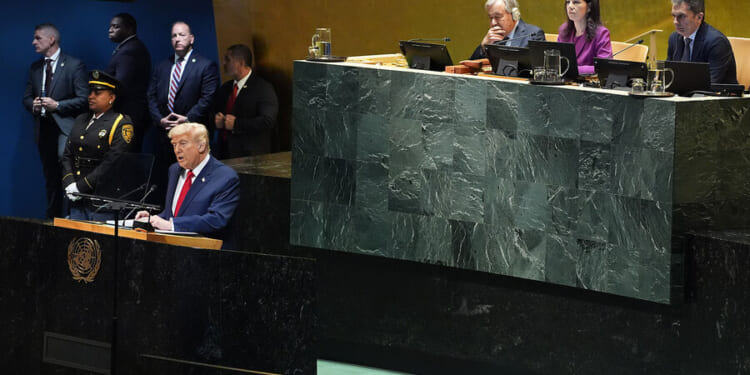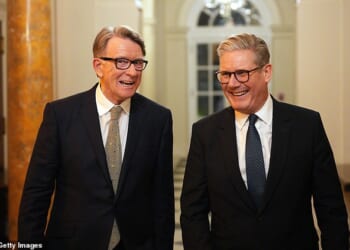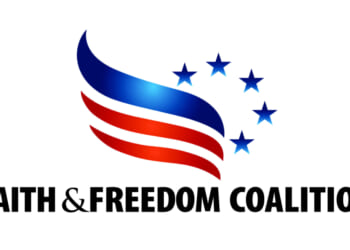In his speech to the General Assembly Tuesday, President Donald Trump had a clarion message for the world: Do what I have done for America in just eight months – particularly in stopping immigration and ending green energy policies – and you too can turn your “failing” countries into enviable successes.
In a rambling discourse that was at times jocular and tediously political (with repeated attacks on the “disaster” of the Biden administration), Mr. Trump chose to home in on global mass migration and “the global warming hoax” as the two key threats of the era to international peace, security, and prosperity.
“The high cost of immigration and the so-called green energy is destroying much of our world,” the president declared in closing, highlighting in particular the impact of those dual threats to “the Europe I love.”
Why We Wrote This
As the United Nations General Assembly opened in New York, President Donald Trump told member states that immigration and green hoaxes are the key threats to international peace and prosperity.
Earlier he had advised the delegates of the U.N.’s 193 member states, “If you don’t get away from the green energy scam, your country is going to fail.”
The speech underscored how perhaps more than ever before, a U.S. president has brought to the international stage the culture wars dividing Americans at home, some international political analysts say.
“What we heard repeatedly were the contrasts between term-two Trump and one-term Biden, and an American president citing at the U.N. two issues at the heart of American political polarization in a way it hadn’t been done before,” says Behnam Ben Taleblu, a senior fellow at The Foundation for the Defense of Democracies, a Washington research institute focused on international security and foreign policy.
“Taking this to the U.N.,” he adds, “demonstrates the intensifying politicization of international security issues.”
America’s “golden age”
Mr. Trump, who is known for loving all things gilt, told his audience they were witnessing “the golden age of America.” Repeating a line he has often used in his second term, he said that in “just eight months … we are the hottest country anywhere in the world, no other country is even close.”
He drew laughter – unlike eight years ago, it was laughter with him, not at him – when he chided the U.N. for giving him a faulty teleprompter and an escalator that stopped when he was halfway up.
And he repeated his claim that he has already stopped seven wars in his second term – conflicts that he said the U.N. had failed to resolve after sometimes decades of fighting and violence.
“In just eight months I ended seven unendable wars,” he said, “No American president has done anything close to that.”
He cited this year’s brief war between Israel and Iran, fighting between Cambodia and Thailand, and the long-simmering dispute between Rwanda and the Democratic Republic of Congo, among others.
Many international security experts dispute whether several of those conflicts have indeed been resolved. But that did not stop Mr. Trump from asserting that many believe – actually he said “everyone” believes – he deserves the Nobel Peace Prize.
Sources close to the president have said Mr. Trump does indeed crave the international recognition the Nobel would bring. He is said to resent that former President Barack Obama was awarded the prize, even though in Mr. Trump’s view he did nothing to deserve it.
Mr. Trump did acknowledge that he has been unable to stop two of the biggest wars, those in Gaza and in Ukraine. But he said Hamas alone was responsible for the destruction and loss of life in Gaza – earning the only applause to interrupt his speech when he said to Hamas, “Release the hostages now!”
And he blamed Russian President Vladimir Putin for his inability to end the war in Ukraine, saying the war “is not making Russia look good, it’s making Russia look bad.”
Saying only “action” stops wars, he repeated his willingness to impose debilitating sanctions on Russia – but only if Europe, which he said is financing Russia’s war machine through energy purchases – agrees to do the same.
Later, after meeting with Ukrainian President Volodymyr Zelenskyy, Mr. Trump announced on social media that he now believes that with Europe’s help, Ukraine could take back all territory occupied by Russia.
Cooperating internationally
Mr. Trump cast doubt on the usefulness of the U.N. – claiming at times that the international body often makes matters worse, as it had by implementing policies that encourage mass migration.
Throughout his second term the U.S. leader has demonstrated a preference for bilateral relations and big-power politics. And from security and trade to immigration, much of the international community has accommodated and flattered him as the best way to stay on the U.S.’s good side.
“The speech leaves very big question marks about how Trump and his administration view the U.N. and multilateralism more broadly and how they intend to approach them,” says Trita Parsi, executive vice president of the Quincy Institute, a foreign policy think tank in Washington.
“The president seemed to blame the U.N. for many of the world’s problems even while underscoring what he said should be its usefulness in what this administration acknowledges is no longer a unipolar world,” says Dr. Parsi, co-author of a recent report promoting a rejuvenated global security order based on international law and multilateralism.
“The question now,” he adds, “is whether the U.N. can retain and even enhance that usefulness while maintaining” its role as a “useful instrument of management of relations among the great powers.”













